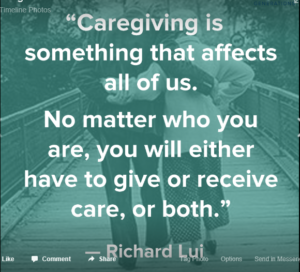HAVE YOU THANKED A CAREGIVER LATELY?
Recently I read an article by Ann Brenoff, a Senior Writer/Columnist at the Huffington Post. It was a realistic piece on caregiving entitled “8 Things You Should Never Say To A Caregiver – And Why. I feel obligated to warn my readers that Ms. Brenoff doesn’t sugarcoat a thing in this article. She’s candid and brutally honest.
It got me to thinking…
What are the things you should say to a caregiver? How do we support and recognize them for all their hard work? Maybe we could have a bumper sticker that says “Honk If You’ve Thanked A Caregiver.” I have seen ones with “Hug A Caregiver” but I’ve yet to see one that says “Help A Caregiver.”
And there are very good reasons we should help and thank our caregivers. The National Alliance for Caregiving (NAC) and the AARP Public Policy Institute published a report on Caregiving in the U.S. 2015. It is an eye opener! Some of the stats show:
- An estimated 43.5 million adults in the US have provided unpaid care to an adult or child in the prior 12 months.
- On average, caregivers have been in their role for 4 years. Higher-hour caregivers are twice as likely to have been in their caregiving role for 10 or more years.
- On average, caregivers spend over 24 ours a week providing unpaid care to a loved one. About 25% spend 41 or more hours and for those caring for a spouse/partner, almost 45 hours per week.
- Caring for a close relative, like a spouse or parent, is more emotionally stressful for caregivers than caring for another relative or non-relative.
- Caregivers most commonly want information about keeping their loved one safe at home but only one in three caregivers made modifications to their loved ones’ home.
- Caregivers of an adult with Alzheimer’s or dementia, or other mental confusion are not only performing more Activities of Daily Living, Instrumental Activities of Daily Living, medical/nursing tasks, and key activities, they have difficulty performing ADL’s and medical/nursing tasks. They are especially vulnerable to emotional stress and negative health impacts.
Being a caregiver s a tough job whether the person you care for lives in their own home (aging in place) or with you in your home. I know when I was in the crux of caregiving for my Mom in her home, there were days when I thought I just couldn’t deal with yet another visit to the Emergency Room arguing with medical personnel on her behalf or another session of explaining to my Mom who I was. I sometimes wished that someone would come to my rescue! But rescuing was not what I needed. What I really needed was:
Someone to, in addition to asking about how my Mom was doing, would ask ME how I was doing.
Someone to visit me during my caregiving stay (it’s a lonely job). It’s like you have some type of cooties, people just stop coming around.
Someone to say, give me your grocery list, I’ll do your Mom’s grocery shopping for you.
Someone to offer to sit with my Mom while I went off to get my nails done, go see a movie, have dinner with my husband or get a massage.
But most of all, I really needed someone to say “You’re doing a great job! Thank you!”
Whether you’re at the beginning, middle or near the end of your caregiving days, you need support. Ask for it! It is almost never offered without solicitation.
How have you thanked a caregiver lately? Send me your comments and let me know.
Cheers!
Marcia
